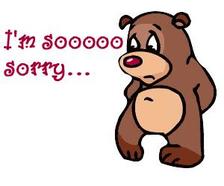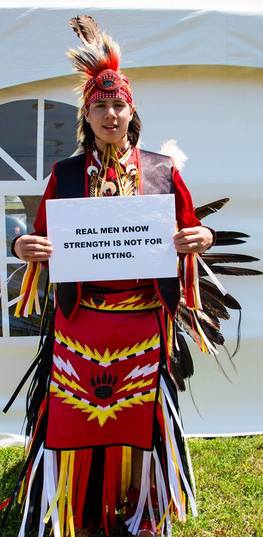|
Taking Responsibility only begins with saying “I’m sorry.” Being truly sorry is an action. It means following through and making sure you do what you need to do to make sure it never happens again. In my work here over the years, I received the most amazing apology I ever heard. It contained what the client was sorry for, why he was sorry for it, declared that it was against all his values and a promise to never do it again. I was deeply moved because the apology was well thought out, eloquent, and he delivered it very sincerely. The very next week, he not only did the same thing again that was hurtful, it was nastier than the first time. People may believe what they hear for a short time, but ultimately, we have a tendency to believe what we see. If what we see is you being the sorriest person in the County but continuing to do it again anyway, you have lost all credibility. When you try to blame someone else for your choices, you are not taking responsibility. It is impossible to do both at the same time. So, why should anyone bother to take responsibility for anything in this world of only admitting to what you got caught for? Simply put- It Frees you. You don’t have to carry around guilt, shame, or the feeling that you are not a good person. All those negative emotions accumulate and over time, make it impossible for you to ever feel good about yourself. You go around blaming others and the world for everything, argue with people frequently which leaves you feeling just plain miserable. Or worse, feeling like a victim all the time, even though you are the one creating it. It’s crazy making. Talk about it, fairly. Take responsibility for your choices. It may not be comfortable at the time, or even right away, but it will begin to free you. And you will notice all your relationships getting better, because you are better. You are getting into the routine of being the person you choose to be. It doesn’t get much better than that really. Reduce Abuse. Support, Mentor, Change.
0 Comments
New Leaf recognizes that our program and offices sit upon the unceded lands in the territories of the Mi’kmaq peoples and Mi’k’ma’ki land where the Peace and Friendship Treaties still hold sway. We are all Treaty Peoples. We are one of the people of the dawn. Kwe’! Happy National Aboriginal Day! 20 years ago, the Government of Canada and various Indigenous organizations came together to designate Summer Solstice, June 21st, as National Aboriginal Day. This day celebrates the culture, traditions, and contributions of all Aboriginal peoples in Canada and recognizes the continued need to build stronger relationships between settlers and Aboriginal peoples in Canada. Building stronger relationships is not the only characteristic New Leaf and National Aboriginal Day share. The New Leaf program is structured around many traditional aspects of Aboriginal culture. At New Leaf, our group sessions and any other conversations we have with our guys and even amongst the staff are always held in circle. Circle is a traditional ceremony structure in which every person in the circle is equal; there is no hierarchy, no one is better than anyone else and no one dictates what or how anyone else speaks. This is a value and tradition that is extremely important to the work we do. We are not here to judge others or dictate the conversation. In traditional ceremony circle, everyone has a turn to speak. Often, the person who begins the conversation has the most on their mind or is in need of the most guidance. Every night in group, Sterling begins by opening the conversation, asking if anyone has anything they would like to check in with or talk about. This gives the guys facing the biggest obstacles or who have just overcome obstacles a chance to share and begin the theme of the discussion, and be offered guidance by the entire group. In traditional ceremony, everyone first has a chance to speak, however what they share is usually linked to what the person before them has said. This builds relationships, listening skills, and strong communication and understanding. We do the same in group. As facilitators, we are simply in the room to guide the discussion and offer what we can, just the same as every other guy in the room. The guys help each other by sharing their experiences. The conversation is almost always naturally linked; we do not need to designate a “theme” for the night’s discussion, the guys genuinely listen to each other, relate to each other, and offer guidance to each other. We value the experience and knowledge the guys have to offer; everyone in the room is there by a different circumstance but for the same underlying issues, and as the Mi’kmaq people and we at New Leaf believe, every individual matters and has something to offer to the rest of the world. Traditional Aboriginal cultures are also extremely family centric with a matriarchal structure. New Leaf helps families by helping the abusive men within them; we cannot expect someone who has caused harm to return to their family without any support and have the tools they need to help develop and maintain a healthy family. New Leaf is focused on the safety of women and children. New Leaf is focused on building and maintaining healthy families. We believe women have the right to self determination and safety, which is directly related to traditional Aboriginal families. We are here to support just as Aboriginal communities came together to do. We are here to address underlying power imbalances which were brought to Turtle Island (the traditional Aboriginal name for Canada) by settlers. It is not acceptable to harm other people, it is a socialized and learned behaviour that we must address at it’s core.
New Leaf operates using these methods and values because they are respectful and they work. These methods and values produce the healthy, helpful, respectful, and meaningful conversation that is necessary in our sessions and in every day relationships. New Leaf and traditional Aboriginal culture value equality, family, and nurturing, and today, on National Aboriginal Day, we remain committed to work toward ensuring these values are represented in our program and are central to our work in building stronger families. Wela’lin |
AuthorsNew Leaf and community contributors Archives
October 2017
Categories
All
|


